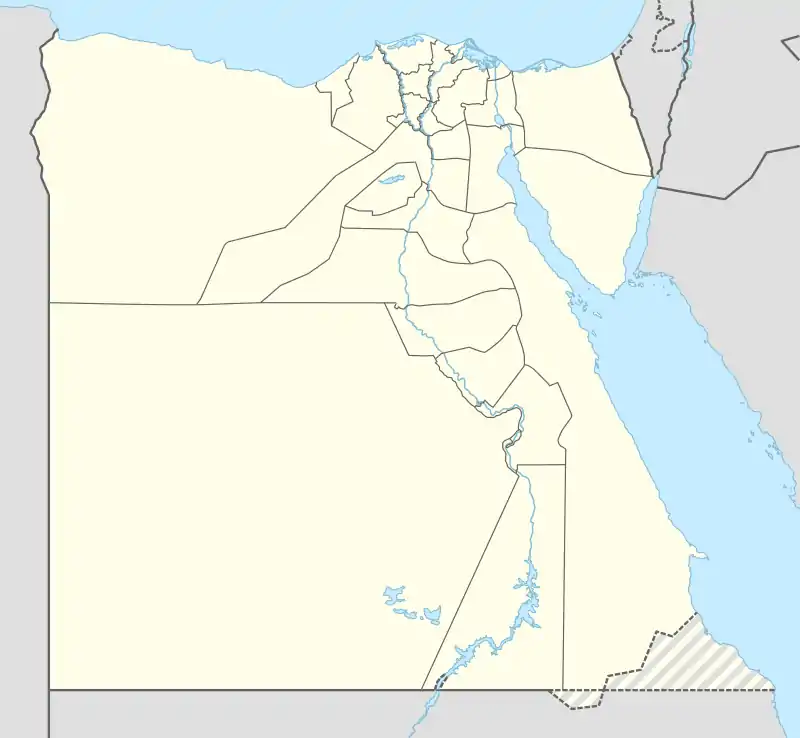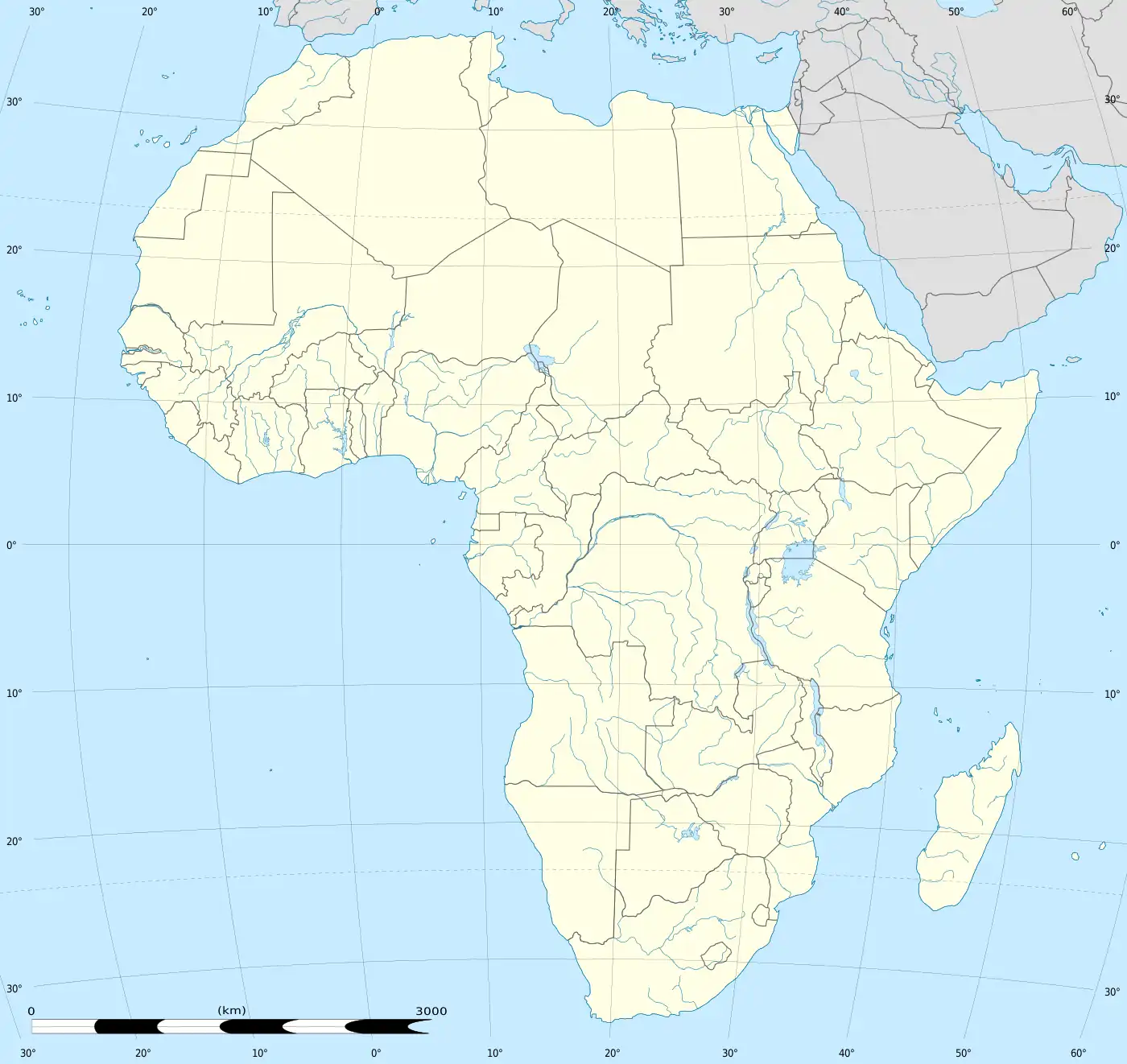El Tor, Egypt
El Tor (Arabic: الطور aṭ-Ṭūr/et-Ṭūr Egyptian Arabic pronunciation: [etˈtˤuːɾ]), also romanized as Al-Tur and At-Tur and known as Tur Sinai, formerly Raithu, is a small city and the capital of the South Sinai Governorate of Egypt. The name of the city comes from the Arabic term for the mountain where the prophet Moses received the Tablets of the Law from God; this mountain is designated Jabal Al Tor.
El Tor
الطور Ⲉⲗ Ⲧⲟⲣ | |
|---|---|
City | |
 | |
 El Tor Location in Egypt  El Tor El Tor (Africa) | |
| Coordinates: 28°14′30″N 33°37′20″E | |
| Country | |
| Governorate | |
| Area | |
| • Total | 2,581 km2 (997 sq mi) |
| Elevation | 14 m (46 ft) |
| Population (2021)[1] | |
| • Total | 43,720 |
| • Density | 17/km2 (44/sq mi) |
| Time zone | UTC+2 (EST) |
| Area code | (+20) 377 |
At-Tur itself appears to have been founded in the 13th century near the site of the ancient Raythou (medieval Raya).[2] The El Tor strain of cholera was discovered there in 1905. It was a quarantine camp for Muslim pilgrims returning from Hajj (the Islamic pilgrimage to Mecca).
History
Monastery
The Raithu desert is situated around El Tor, between Saint Catherine and the Red Sea. It is part of the Archdiocese of Mount Sinai and Raithu of the Eastern Orthodox Patriarchate of Jerusalem. The "Martyrs of Raithu" were 43 anchorites (early Christian hermits) murdered by bedouins (desert dwellers) during the reign of Emperor Diocletian (284-305CE). Christian monks fleeing persecutions had been present since the 3rd century, and the Raithu monastery (or Rutho) was commissioned in the 6th century by Byzantine emperor Justinian. The latter was proposed as a UNESCO World Heritage site on November 1, 1994, in the Cultural category.[3] Theodore of Raithu was champion of neo-Chalcedonism in the early 7th century.
Portuguese attack
En route to Suez with the objective to seek and destroy the Ottoman fleet, a Portuguese Armada was sent in 1541 to Red Sea.
After several days sailing, the commander Estevão da Gama gives the order to direct a surprise attack. The troops were able to disembark and the defenders came out to the shore but were pushed to the city not managing to close the city doors. The Portuguese as the city fell, were ready to loot, but two Priests came to the Commander, and appeal to him avoiding the destruction. Several soldiers were armed Knights after a mass, and the armada stayed for a few days preparing to sail and attack Suez.
Modern Egypt
El Tor was captured by Israel during the Six-Day War of 1967. It was returned to Egypt, along with the rest of the Sinai Peninsula, following the 1979 Egypt–Israel peace treaty.
Geography
Climate
Its climate is classified by Köppen-Geiger system as hot desert (BWh).
| Climate data for El Tor | |||||||||||||
|---|---|---|---|---|---|---|---|---|---|---|---|---|---|
| Month | Jan | Feb | Mar | Apr | May | Jun | Jul | Aug | Sep | Oct | Nov | Dec | Year |
| Record high °C (°F) | 28.8 (83.8) |
29.7 (85.5) |
35.9 (96.6) |
38.9 (102.0) |
42.6 (108.7) |
42.4 (108.3) |
42.5 (108.5) |
40.5 (104.9) |
38.2 (100.8) |
35.6 (96.1) |
31.7 (89.1) |
28.7 (83.7) |
42.6 (108.7) |
| Average high °C (°F) | 20.9 (69.6) |
21.9 (71.4) |
24.2 (75.6) |
28.0 (82.4) |
31.0 (87.8) |
32.3 (90.1) |
33.2 (91.8) |
33.3 (91.9) |
31.0 (87.8) |
28.2 (82.8) |
25.3 (77.5) |
22.3 (72.1) |
27.6 (81.7) |
| Daily mean °C (°F) | 16.1 (61.0) |
17.0 (62.6) |
19.9 (67.8) |
23.4 (74.1) |
26.2 (79.2) |
27.9 (82.2) |
28.9 (84.0) |
29.1 (84.4) |
27.6 (81.7) |
24.5 (76.1) |
20.7 (69.3) |
17.4 (63.3) |
23.2 (73.8) |
| Average low °C (°F) | 9.5 (49.1) |
10.2 (50.4) |
13.5 (56.3) |
17.2 (63.0) |
20.3 (68.5) |
23.1 (73.6) |
24.0 (75.2) |
24.8 (76.6) |
23.2 (73.8) |
19.1 (66.4) |
14.4 (57.9) |
11.4 (52.5) |
17.6 (63.7) |
| Record low °C (°F) | 2.6 (36.7) |
4.2 (39.6) |
5.6 (42.1) |
8.8 (47.8) |
13.2 (55.8) |
18.4 (65.1) |
20.3 (68.5) |
20.7 (69.3) |
17.2 (63.0) |
10.5 (50.9) |
7.0 (44.6) |
5.8 (42.4) |
2.6 (36.7) |
| Average precipitation mm (inches) | 0 (0) |
0 (0) |
0 (0) |
0 (0) |
0 (0) |
0 (0) |
0 (0) |
0 (0) |
0 (0) |
1 (0.0) |
1 (0.0) |
5 (0.2) |
7 (0.3) |
| Average precipitation days (≥ 1.0 mm) | 0 | 0 | 0 | 0 | 0 | 0 | 0 | 0 | 0 | 0 | 0 | 0.1 | 0.1 |
| Average relative humidity (%) | 53 | 51 | 53 | 55 | 56 | 57 | 59 | 63 | 66 | 61 | 58 | 55 | 57.2 |
| Source 1: NOAA[4] | |||||||||||||
| Source 2: Climate Charts[5] | |||||||||||||
See also
References
- "Aṭ-Ṭūr (Kism (urban and rural parts), Egypt) - Population Statistics, Charts, Map and Location". citypopulation.de. Retrieved 17 March 2023.
- Peacock, David; Peacock, Andrew (2008). "The Enigma of 'Aydhab: a Medieval Islamic Port on the Red Sea Coast". International Journal of Nautical Archaeology. 37 (1): 32–48. doi:10.1111/j.1095-9270.2007.00172.x. ISSN 1057-2414.
- Rutho Monastery - UNESCO World Heritage Centre Retrieved on 2009-03-26.
- "El–Tor Climate Normals 1961–1990". National Oceanic and Atmospheric Administration. Retrieved October 25, 2015.
- "El Tor, Egypt Climate, Global Warming, and Daylight Charts and Data". Climate Charts. Archived from the original on 17 August 2013. Retrieved 12 August 2013.
External links
- Portuguese Sea Battles Volume III - From Brazil to Japan 1539 - 1579 - https://www.amazon.co.uk/Books-Saturnino-Monteiro/s?rh=n%3A266239%2Cp_27%3ASaturnino+Monteiro